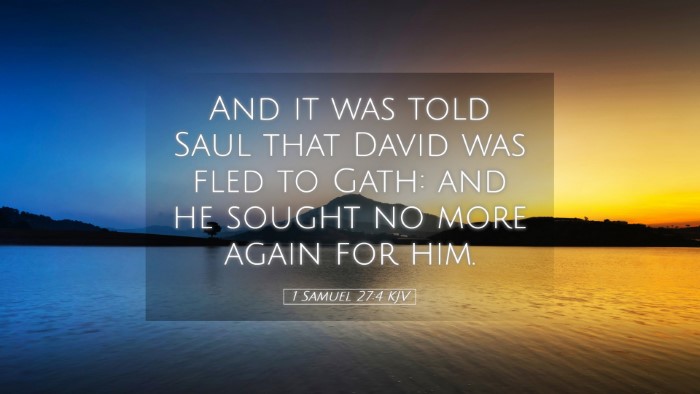Contextual Analysis
The narrative within 1 Samuel captures a pivotal moment in the life of David as he finds himself in the land of the Philistines after fleeing from King Saul. This transition is noteworthy as it highlights both David's strategic decisions and the ensuing consequences on his relationship with Saul and Israel.
Commentary Insights
The following insights come from multiple public domain commentaries, offering a rich tapestry of understanding regarding 1 Samuel 27:4.
Matthew Henry's Commentary
Matthew Henry emphasizes the significant change in David's circumstances as he takes refuge in Gath, a city of the Philistines. He points out that this action may have seemed to reflect weakness or a lack of faith, considering the previous anointing of David as king. Henry notes that a child of God may, at times, escape to the world for safety, but this should be a temporary reprieve and not a deliberate stay. He highlights that Saul’s pursuit of David waned, suggesting God's providential role in the events unfolding, as Saul was no longer searching for David once he believed he was safe in Philistine territory.
Albert Barnes' Notes
Albert Barnes elaborates on Saul's reaction to the news of David's whereabouts. His position indicates a shift in the dynamic between Saul and David. Initially fixated on eradicating David as a potential rival, Saul's departure from pursuing him signifies either resignation or the belief that David had aligned himself with the enemy. Barnes postulates that Saul's disinterest in pursuing David again reflects not only a strategic decision but also a moment of introspection regarding the futility of his cause.
Adam Clarke's Commentary
Adam Clarke takes a nuanced approach, focusing on the implications of David's decision to seek refuge among the Philistines. Clarke argues that this move demonstrates David’s humanity and the burdens he bore during this tumultuous period of his life. Despite his anointing, David found himself in desperate circumstances, forcing him to make difficult decisions. Clarke further suggests that the cease in Saul’s aggression towards David might indicate a more profound realization of God’s hand within the situation, prompting both leaders to recognize their roles in a larger divine plan.
Conclusion
In conclusion, 1 Samuel 27:4 serves as a reminder of the complex nature of human decisions within the scope of divine providence. It urges believers to trust in God amidst adversities, reflect on the significant lessons of leadership, and find hope in the quiet moments of their journeys. Exploring the narratives surrounding David’s life continues to provide valuable insights into the faithfulness of God, even when circumstances appear bleak.


